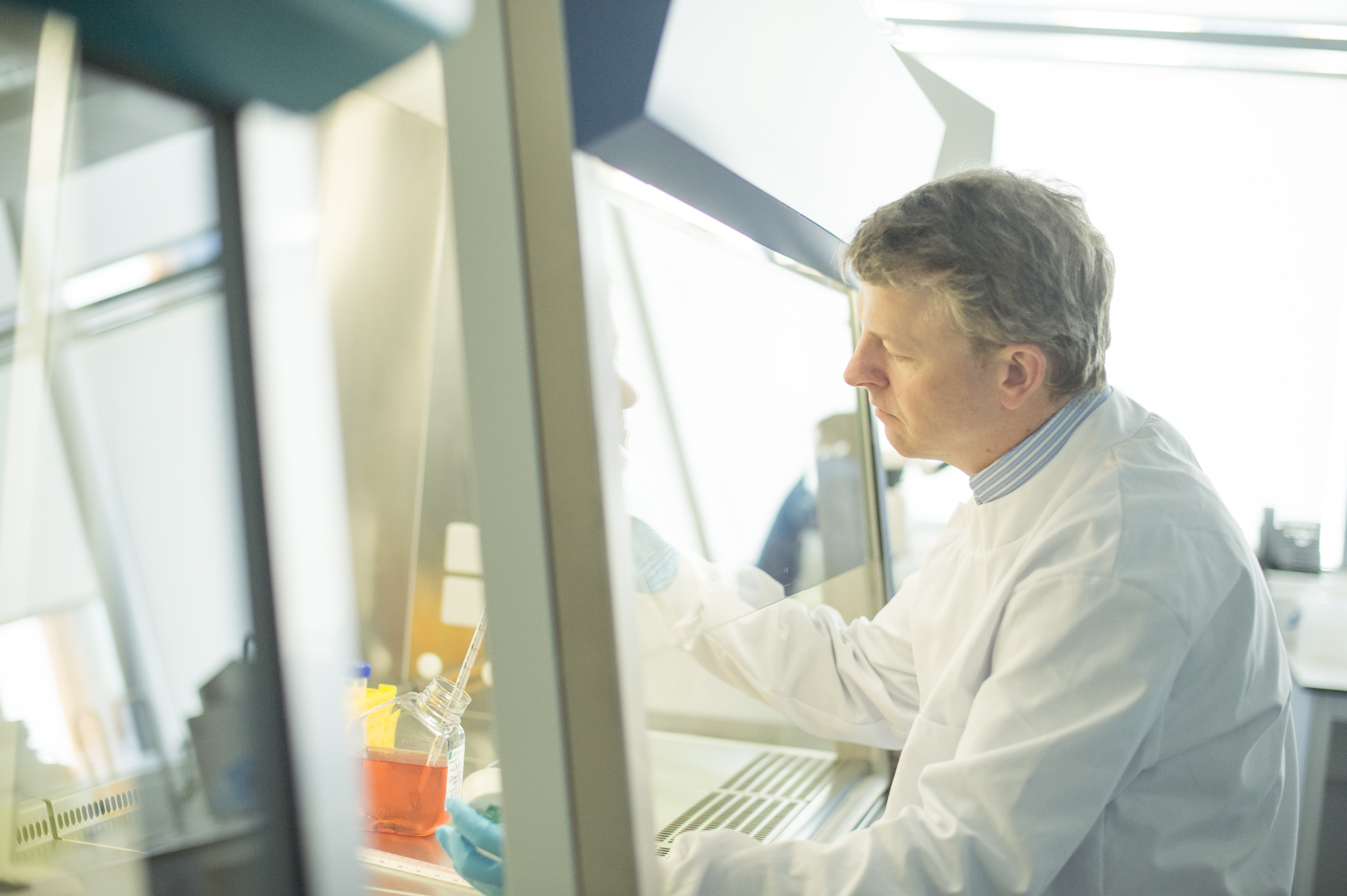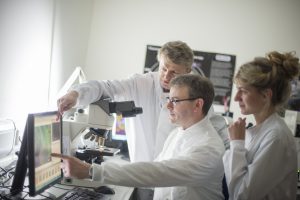
June 29, 2018, by Rob Ounsworth
The ‘wow’ factor: Professor David Bates and the University of Nottingham’s Centre for Cancer Sciences
You have been appointed as Director of the University’s Centre for Cancer Sciences. What does it this entail?
As lead of the Cancer Research Priority Area (RPA), I meet many great scientists right across the University. The biggest challenge in my RPA role was to help people communicate their research, open up about it, and provide a platform that we can build on together. We’ve been building new collaborative networks, new grants and teams, to address new problems and come up with new solutions to old problems. I have expertise in cell biology and in vivo systems, but not in bioinformatics or drug design. I can do fluorescence imaging but I can’t do MRI. There are people here who are fantastic at all these. So building these networks enables us to do better science.
The Centre for Cancer Sciences embodies this approach and the real desire of academics in cancer research to work together. I very much like the attitude in Nottingham, which is ‘we can do great stuff’. It’s a very encouraging environment, with great facilities. The centre will bring all of our cancer research together to be even better collectively.
Can you explain your research?
Most of my work is based around a protein called Vascular Endothelial Growth Factor or VEGF, which stimulates growth of blood vessel cells. Blood vessels grow to provide nutrients to tissues to support growth, or in response to changes in the environment, such healing a wound. Blood vessels also grow to support disease, or to help fix it. As cancers grow, they need nutrients so they need blood vessels. So what controls blood vessel growth contributes to many different diseases.
All cancers produce VEGF. One form of VEGF causes blood vessels to grow and the other keeps them quiet. With disease, wound healing or remodelling, you switch from one to the other. The switch is made by cells that produce VEGF, changing DNA into two forms of protein-producing RNA. One makes blood vessels grow and one stops this growth. This is alternative splicing and my focus is on how we can control this, turning on or off each form of VEGF. So in cardiovascular disease you can make blood vessels grow, or with cancer you can stop the blood vessels growing. Essentially that’s my research.
Every few months, somebody will show me a piece of data that just goes “Wow, it works!” We also saw this molecule that inhibited diabetic neuropathy, a pain killer. We’ve got data on VEGF blocking lung disease. It’s astonishing. Those sorts of things are great
What drew you to the area of research?
Medical research was always my passion, but my first degree was in Zoology. I wanted to do some work on spider toxins here in Nottingham but I got a 2:2 in my degree, which meant that my PhD place wasn’t awarded. I was expected to get a first so it was a bit of a shock. I got a job as a research assistant working on breast cancer, particularly on how the arm swells up after breast cancer treatment. There was an opportunity to do a PhD on how the smallest blood vessels control fluid movement across blood vessel walls, and I loved it. I met other people who were the most intelligent people I ever met. One of them asked me if I like to go and work to California as a postdoc, and… well, why wouldn’t you?
It was at the University of California Davis. I worked on how blood vessels control fluid transport across the vessel wall. VEGF was discovered at Genentech just down the road, in 1989-90. And I was there in 1993. I got some VEGF and applied it to blood vessels to see what happened to escape of fluid into the tissues. The results were dramatic, and I’ve been working on VEGF ever since.

Professor David Bates, Dr Nigel Mongan, Associate Professor of Cancer Biology and Translational Research, and PhD student Veronika Metzler studying a florescent image of a skin cell
How would you say your research affects the average person?
My research is based around how blood vessels grow which affects how people develop cancers, how people go blind, and many other diseases. The major treatment for the most common cause of blindness is injection of Anti-VEGF antibodies directly into your eyeball. My early work was on how VEGF functions, and there are now many drugs on the market that target that mechanism. We worked with drug companies, including AstraZeneca and Genentech. When people get treated for blindness, or for cancer, which involves targeting VEGF, my work will have contributed towards that.
What’s been the greatest moment of your career so far?
The greatest moment of your life tends to be the birth of your children. The births of my children both coincided with the publication of the two most important papers in my career, so it sort of took the shine off the papers! The first one was the description of the anti angiogenic VEGF that I discovered. The second paper, coinciding with the birth of my daughter, showed that it actually worked, that it blocked blood vessel growth in the eye, and stopped cancers growing in mice.
Looking at the DNA sequence when we first identified this other form of VEGF and immediately understanding its importance was also a pretty phenomenal moment. The first time I gave VEGF to the blood vessel and saw it explode was also unforgettable. Recently, I showed a piece of data which I think indicates we may have a treatment for kidney disease. Every few months, somebody will show me a piece of data that just goes “Wow, it works!” We also saw this molecule that inhibited diabetic neuropathy, a pain killer. We’ve got data on VEGF blocking lung disease. It’s astonishing. Those sorts of things are great.
People don’t tell me what the results are ahead of a lab meeting because they want to show them to me in front of everybody else and see my reaction. It’s great.
Professor of Oncology David Bates, Faculty of Medicine and Health Sciences, is Director of the University of Nottingham’s Centre for Cancer Sciences.
No comments yet, fill out a comment to be the first

Leave a Reply